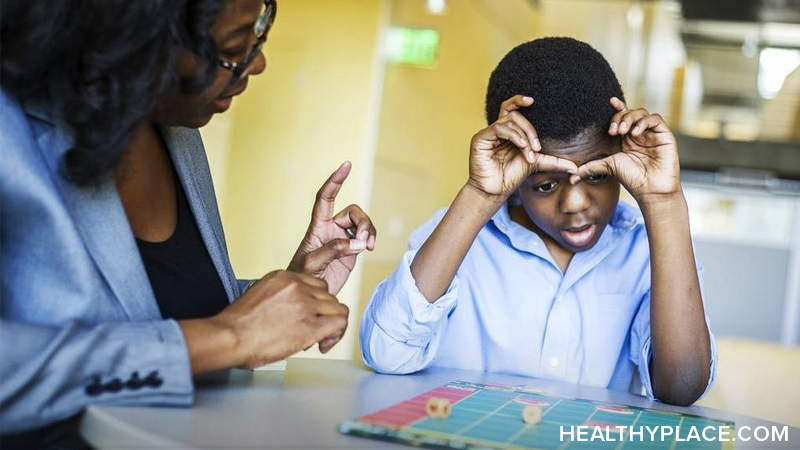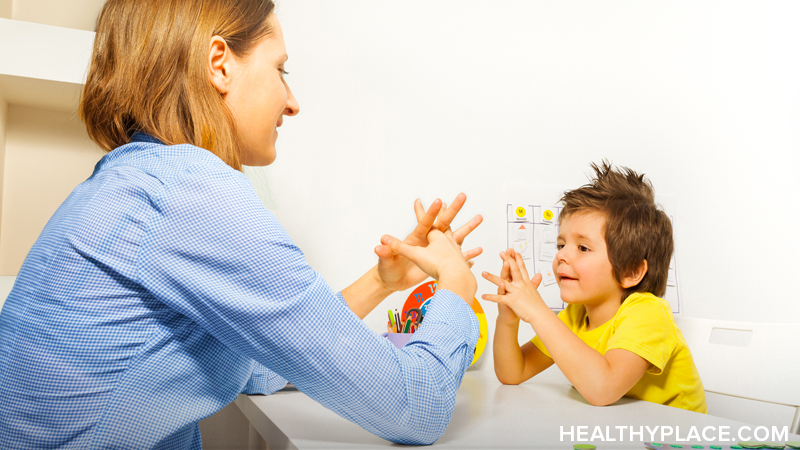
Many parents have questions about giving antidepressants to their child; especially in light of an FDA warning that antidepressants may cause suicidal thoughts and behaviors in children and adolescents. Here are some answers.
When the FDA first issued the antidepressant suicide warnings, many parents became alarmed. After all, the FDA required antidepressants to carry the strongest possible warning about their link to suicidal behavior in children, adolescents and young adults (ages 18-24). And while antidepressant medications can be an effective way to treat depression and other mental disorders in children and adolescents, they also carry the potential of harmful side effects and complications.
The American Psychiatric Association and American Academy of Child and Adolescent Psychiatry prepared the fact sheet below to help parents make informed decisions about the use of antidepressant medications in treating depression in children, adolescents, and young adults.
Information for Patients and Families
Prepared by the American Psychiatric Association and the American Academy of Child and Adolescent Psychiatry
Contents
Introduction
As the parent or guardian of a child or teenager with clinical depression, or as a patient yourself, you may be aware of the recent decision by the Food and Drug Administration (FDA) to attach a cautionary label, or "black box warning," to all antidepressant medications used to treat depression and other disorders in children and adolescents.
The American Psychiatric Association and the American Academy of Child and Adolescent Psychiatry have prepared this Fact Sheet to help patients and families make informed decisions about obtaining the most appropriate care for a child with depression.
Depression is an illness that can affect every part of a young person's life and that of his or her family. It can disrupt relationships among family members and friends, hurt school performance, and lead to general health problems through its effects on eating, sleeping, and exercise. If left untreated, or is not correctly treated, depression can be very dangerous because of the risk of suicide associated with the illness.
Fortunately, when depression is recognized and correctly diagnosed, it can be treated successfully. A comprehensive program of care should be tailored to the needs of each child and his or her family. Treatment may include psychotherapy or a combination of psychotherapy and medication. It may also include family therapy or work with the child's school as well as interacting with peer support and self-help groups.
What is a black box warning?
A "black box warning" is a form of label placed on some medications. The FDA uses it to alert prescribing doctors and patients that special care should be exercised in certain uses of a medication; for example, for patients with particular medical conditions, or patients within a certain age range. The FDA has decided to require such a warning label for all antidepressant medications used to treat depression and other disorders such as anxiety and obsessive-compulsive disorder (OCD) in children and adolescents.
What prompted the FDA warning?
In 2004, the FDA reviewed 23 clinical trials involving more than 4,300 child and adolescent patients who received any of nine different antidepressant medications. No suicides occurred in any of these studies. Most of the studies that the FDA examined used two measures to assess suicidal thinking and behavior, which the FDA refers to collectively as "suicidality":
- All used "Adverse Event Reports" which are reports made by the research clinician if a patient (or their parent) spontaneously shares thoughts about suicide or describes potentially dangerous behavior. The FDA found that such "adverse events" were reported by approximately 4 percent of all children and adolescents taking medication compared with 2 percent of those taking a placebo, or sugar pill. One of the problems with using this approach is that most teenagers do not talk about their suicidal thoughts unless they are asked, in which case no report is filed.
- In 17 of the 23 studies, a second measure was also available. These were standardized forms asking about suicidal thoughts and behaviors completed for each child or teen at each visit. In the views of many experts, these measures are more reliable than event reports. The FDA's analysis of the data from these 17 studies found that medication neither increased suicidality that had been present before treatment nor did it induce new suicidality in those who were not thinking about suicide at the start of the study. In fact, on these measures, all studies combined showed a slight reduction in suicidality over the course of treatment.
Although the FDA reported both sets of findings, the agency did not comment on the contradiction between them.
It is important to recognize that suicidal thoughts are common part of depressive illnesses. In fact, research demonstrates that over 40 percent of children and adolescents with depression think about hurting themselves. Treatment that increases communication about these symptoms can lead to more appropriate monitoring which decreases the actual risk of suicide.
Did the FDA prohibit the use of antidepressant medications by children and adolescents?
No, the FDA did not prohibit use of the medications for youth. Rather, the agency called on physicians and parents to closely monitor children and adolescents who are taking antidepressants for a worsening in symptoms of depression or unusual changes in behavior. The "black box warning" states that antidepressant medications are associated with an increased risk of suicidal thinking and/or behavior in a small proportion of children and adolescents, especially during the early phases of treatment.
Can antidepressant medications help children and adolescents with depression?
Yes. A large number of clinical research trials supported by pharmaceutical companies and by the federal government have clearly demonstrated the effectiveness of medications in relieving the symptoms of depression. An important recent study, funded by the National Institute of Mental Health (NIMH), examined the effectiveness of three different treatment approaches for adolescents with moderate to severe depression.
- One treatment approach used was the antidepressant medication fluoxetine, or Prozac®, which is approved by the FDA for use with pediatric patients.
- The second treatment was a form of psychotherapy called cognitive behavioral therapy, or CBT; the aim of CBT is to help a patient recognize and change negative patterns of thinking that may contribute to depression.
- The third approach combined medication and CBT.
These active treatments were compared to the results obtained from a placebo.
At the end of 12 weeks, the researchers found that 71 percent, or nearly three in four, of the young patients who received the combination treatment (i.e., medication + CBT) improved significantly. Of those receiving medication alone, slightly more than 60 percent improved. The combination treatment was nearly twice as effective in relieving depression as the placebo or psychotherapy alone.
Importantly, all three treatments were shown to significantly reduce the frequency of suicidal thinking and behavior. Participants in the study were systematically asked about such thoughts and behaviors. After three months of treatment, the number of young people experiencing such thoughts and behaviors dropped from one-in-three to one-in-ten. There were no completed suicides among adolescents in the study.
A key lesson of this research is that medication can be an important and valuable treatment for depression in children and adolescents, but that combined treatments, customized to the needs of patients, may be even better. Optimal treatment often will include individual psychotherapy, both to enhance the effectiveness of medication and to help reduce the risk of suicidal thoughts or behaviors.
Do antidepressants increase the risk of suicide?
There is no evidence that antidepressants increase the risk of suicide. There is, however, much evidence that depression significantly increases a child's or adolescent's risk for suicide. Not all suicidal children have depression, and very rarely does a depressed child die as a result of suicide. Nonetheless, children with a mood disorder such as depression are five times more likely to attempt suicide than children who are not affected by these illnesses.
This question brings to the fore the important point noted above: that is, the FDA reported an increase in spontaneous reports of suicidal thoughts and/or behavior among children receiving medication, but there is no evidence that these suicidal thoughts or behaviors lead to an increased risk of suicide.
Research further demonstrates that the treatment of depression - including treatment with antidepressant medication -- is associated with an overall decrease in the risk of suicide. Data collected by the Centers for Disease Prevention and Control (CDC) show that between 1992 and 2001, the rate of suicide among American youth ages 10 - 19 declined by more than 25 percent. It is noteworthy that the same ten-year period was marked by a significant increase in the prescribing of antidepressant medications to young people. The dramatic decline in youth suicide rates correlates with the increased rates of prescribing one particular category of antidepressant medication, called selective serotonin reuptake inhibitors, or SSRI's, to young people in this age group.
What factors other than depression increase the risk of suicide?
Research has identified risk factors for suicide in addition to depression. One very important risk factor is a previous suicide attempt. A child who has attempted suicide once is much more likely to try to kill himself than a child who has never made an attempt. Other risk factors include the presence of serious mental disorders other than depression - for example, eating disorders, psychosis, or substance abuse. Events in a child's life, such as the loss of or separation from a parent, or - in adolescence - the end of a romantic relationship, physical or sexual abuse, or social isolation may increase the risk of suicide, especially if such events lead to depression in a vulnerable child.
Suicidal thoughts and behaviors are common among youth, especially during the turbulent years of adolescence. The CDC reports that nearly one-in-six adolescents think about suicide in a given year. Fortunately, very few of these young people die as a result of suicide
Every suicide is a tragedy. Because suicidality is a key symptom of depression, optimal treatment for children and adolescents with depression must include careful monitoring for suicidal thoughts or behavior. It is important to keep in mind that suicidal thoughts and actions decline with appropriate treatment.
Does talking about suicide signal increased likelihood that a child will hurt him/herself?
Any expression of suicidal thoughts or feelings by a child or adolescent is a clear signal of distress and should be taken very seriously by health care professionals, parents, family members, teachers, and others.
Psychiatrists and other mental health specialists have found that when a young person talks about suicidal thoughts, it often opens the door to discussion regarding the need to take special safety precautions or protective measures; thus a treatment approach that increases discussion of previously unspoken suicidal thoughts or impulses is helpful. Much more worrisome and potentially dangerous is a young person with depression who successfully hides the fact that he or she is having suicidal thoughts.
How can I be certain that my child has depression?
A parent, physician, teacher, or another observant adult may notice indications of depression in a child or adolescent. If you suspect the presence of depression, you should seek a comprehensive evaluation and an accurate diagnosis. These are essential to the development of an appropriate and effective treatment plan.
While research has identified the signs and symptoms of major depression, depression is not always an easy disorder to recognize. In children, the classic symptoms often may be obscured by other behavioral and physical complaints - features such as those listed in the right column of the table below. In addition, many young people who are depressed will also have a second psychiatric condition.
At least five of the following symptoms must be present to the extent that they interfere with daily functioning over a minimum period of two weeks.
Signs and Symptoms of
Major Depressive Disorder |
Signs of Depression
Frequently Seen in Youth |
| Depressed mood most of the day |
Irritable or cranky mood; Preoccupation with song lyrics that suggest life is meaningless |
| Decreased interest/enjoyment in once-favorite activities |
Loss of interest in sports, video games, and activities with friends |
| Significant weight loss/gain |
Failure to gain weight as normally expected; anorexia or bulimia; frequent complaints of physical illness, e.g., headache, stomach ache |
| Insomnia or hypersomnia |
Excessive late-night TV; refusal to wake for school in the morning |
| Psychomotor agitation/retardation |
Talk of running away from home, or efforts to do so |
| Fatigue or loss of energy |
Persistent boredom |
| Low self-esteem; feelings of guilt |
Oppositional and/or negative behavior |
| Decreased ability to concentrate; indecisive |
Poor performance in school; frequent absences |
| Recurrent suicidal ideation or behavior |
Recurrent suicidal ideation or behavior (writing about death; giving away favorite toys or belongings) |
Major depression, or clinical depression, is one form of the larger group of mood disorders, also called "affective" disorders. These include dysthymia, a mood disorder in which symptoms generally are less severe than in major depression, but the illness is marked by a more chronic and persistent course; rather than shifting episodically into well-defined periods of depression, the child with dysthymia lives in a world tinted a joyless gray. Another form of the illness is bipolar disorder in which periods of depression alternate with periods of mania, the hallmarks of which are unnaturally high levels of energy, grandiosity and/or irritability. Bipolar disorder may first appear as a depressed episode. Research has shown that treating unrecognized bipolar depression with antidepressant medications may trigger the manic phase of the illness. Children who have a family history of bipolar disorder will require special treatment considerations that should be discussed with your child's physician.
What should depression treatment consist of?
Your child's physician, in consultation with the parents/guardians, and, as appropriate, with your child, should develop a comprehensive treatment plan. This will typically include a combination of individual psychotherapy and medication. It may also include family therapy, or work with the counseling office at your child's school.
The physician should describe and discuss with you and your child or adolescent patient the risks and benefits of any treatment, which may or may not include treatment with medication.
One antidepressant medication - fluoxetine, or Prozac® - is formally approved by the FDA for treating depression in pediatric patients. You should know, however, that off-label prescribing of antidepressants - that is, prescribing an antidepressant that has not been formally approved by the FDA for use with child and adolescent patients - is common and consistent with general clinical practice. Of the approximately 30- to 40 percent of children and adolescents who do not respond to an initial medication, a substantial number will respond to an alternate medication.
If you and your child's physician do not see evidence of improvement in your child's health within 6-8 weeks, the doctor should reevaluate the treatment plan and consider changes.
How can I help monitor my child?
General strategies for suicide prevention should be employed if a child, or any member of a family, has depression.
- Lethal means, such as guns should be removed from the house, and large quantities of dangerous medications, including over-the-counter drugs, should not be left in an accessible location.
- Families should work in consultation with their child's physician or another mental health professional to develop an emergency action plan, including access to a 24-hour number available to deal with crises.
- If your child voices new or more frequent thoughts of wanting to die or to hurt him- or herself or takes steps to do so, you should contact your child's doctor immediately.
The APA and AACAP believe that rather than requiring adherence to a prescribed monitoring schedule - that is, a fixed schedule that dictates how often and over what period of time children receiving antidepressant medications should be seen by a physician - the frequency and nature of monitoring should be individualized to the needs of the child and family.
Some children and teens may also show other physical and/or emotional reactions to antidepressants. These include increased anxiety or even panic, agitation, aggressiveness, or impulsivity. He or she may experience involuntary restlessness or an unwarranted elation or energy accompanied by fast, driven speech and unrealistic plans or goals. These reactions are more common at the start of treatment, although they can occur at any point in the course of treatment. If you see these symptoms, consult your doctor. It may be appropriate to adjust the dosage, change to a different medication, or stop using medication.
In a small number of instances, a child or adolescent might have extreme reactions to antidepressants or other commonly used medications such as penicillin or aspirin as a result of genetic, allergic, drug interaction, or other unknown factors. Whenever you are concerned about any unexpected symptoms you observe in your child, immediately contact the child's doctor.
What treatments for childhood and adolescent depression other than medication are available?
Various forms of psychotherapy, including cognitive behavioral therapy (CBT), and interpersonal therapy (IPT) have been shown to be effective in treating milder forms of depression as well as anxiety and other mental and behavioral disorders. The aim of CBT is to help a patient recognize and change negative patterns of thinking that may contribute to depression. The focus of IPT is to help an individual address issues involving interpersonal relationships and conflicts that seem to be important in the onset and/or continuation of depression. Simply seeing a skilled health professional regularly for several weeks will result in a reduction in the symptoms of depression in about a third of teenagers. As noted previously, however, it may require several months of treatment before depressed mood and accompanying suicidal thoughts and feelings begin to improve.
Research has also shown that when used in combination with a medication, interventions such as CBT may have a significant protective effect against suicidal ideation and/or behaviors.
Will my child's depression pass without treatment?
Depression tends to come and go in episodes, but once a child or adolescent has one period of depression, he or she is more likely to get depressed again at some point in the future. Without treatment, the consequences of depression can be extremely serious. Children are likely to have ongoing problems in school, at home, and with their friends. They are also at increased risk for substance abuse, eating disorders, adolescent pregnancy, and suicidal thoughts and behaviors.
Can my child keep taking an antidepressant medication now being prescribed?
If your child is being treated with a medication and is doing well, he or she should continue with the treatment. Research suggests that any increased risk of suicidal thoughts or behaviors is most likely to occur during the first three months of treatment. Teens especially should know about this possibility, and the patient, parents, and physician should discuss a safety plan - for example, who the child should immediately contact - if thoughts of suicide occur.
More critically, no patient should abruptly stop taking antidepressant medications because of the possibility of adverse withdrawal effects such as agitation or increased depression. Parents contemplating changing or terminating their child's antidepressant treatment should always consult with their physician before taking such action.
How can I advocate effectively for my child who has depression?
As your child's guardian and strongest advocate, you have the right to any and all information available about the nature of your child's illness, the treatment options, and the risks and benefits of treatment. Make sure your child receives a comprehensive evaluation. Ask lots of questions about the diagnosis and any proposed course of treatment. If you are not satisfied with the answers or the information you receive, seek a second opinion. Help your child or teen-ager learn, in an age-appropriate way, about the illness so he or she can be an active partner in treatment.
Disclaimer
The information contained in this guide is not intended as, and is not a substitute for professional medical advice. All decisions about clinical care should be made in consultation with a child's treating physician.
 Detailed information on prescription medication assistance programs for psychiatric medications.
Detailed information on prescription medication assistance programs for psychiatric medications.







